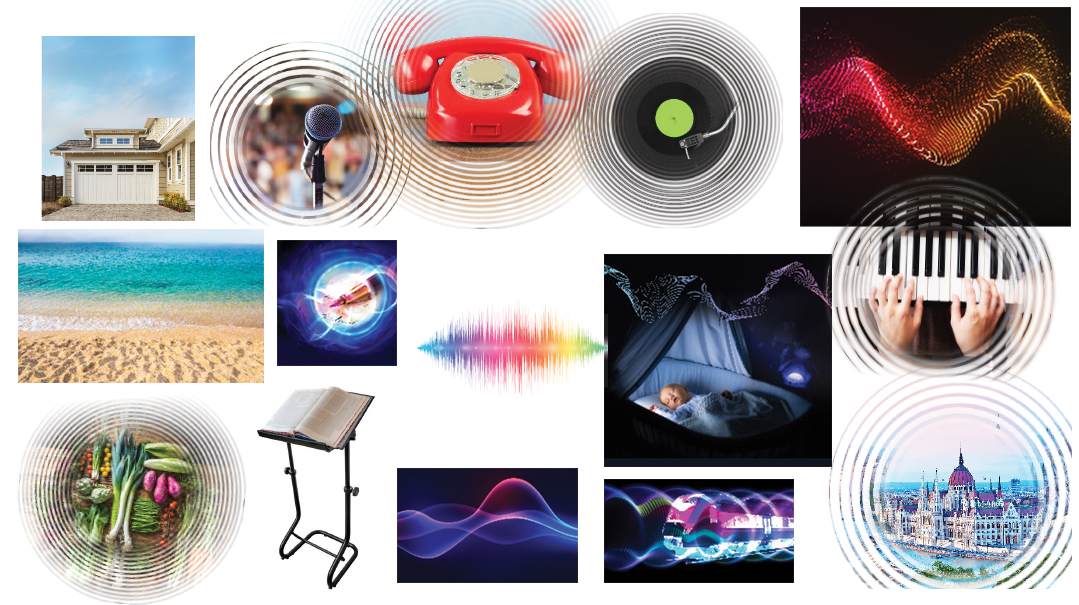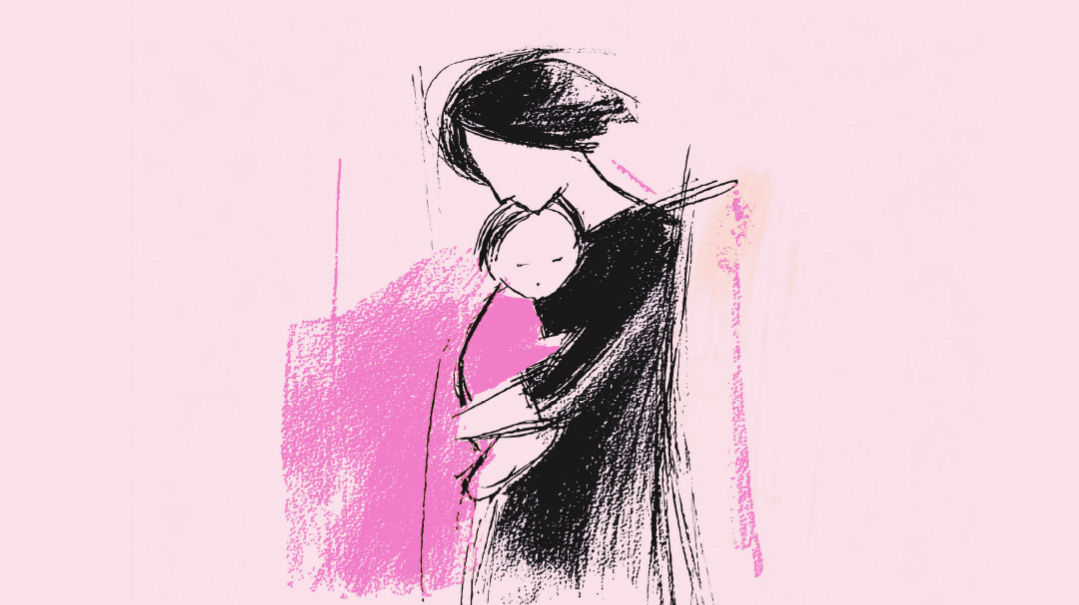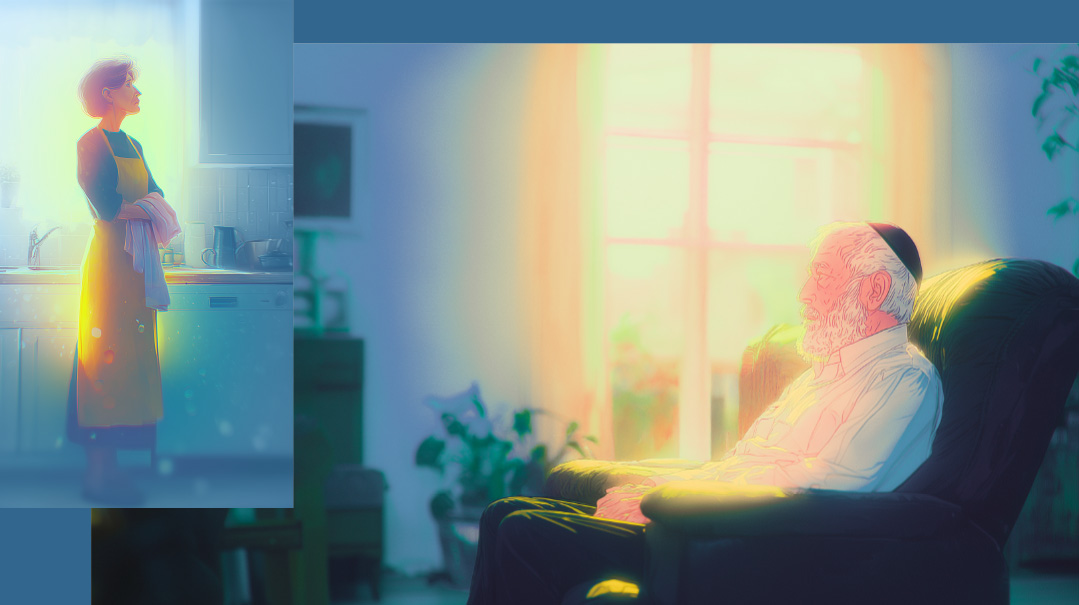Sounds of My Childhood
| December 30, 2020Go back in time, to your childhood home. Picture the scenes, inhale the scents, and listen closely. What do you hear? 16 Recollections

Door of Opportunity
Elana Moskowitz
For many adults, the sounds of childhood invoke memories of whistling tea kettles, whispered lullabies, and the like. But for my siblings and me, it’s the hum of an electric garage door that takes us down memory lane.
Perhaps it was a structural quirk or a particularly powerful motor, but when the garage door buzzed across its metal track and descended with a thump, the sound projected through every room of our house. And that could only mean one thing: Daddy was home.
Even though my father was exhausted after a day of treating desperately sick patients, dinner was just the first stop on his itinerary. Shortly thereafter, the gentle vibrations of that garage door once again resonated to the upper floor of the house; Daddy was on his way to his daf yomi shiur.
Growing up in a small town offered my father scant opportunity for Torah study; the first time he was privileged to a formal Torah education was when he enrolled in YU. Nonetheless, when presented with the prospect of joining a daf yomi shiur in the early 1980s, my father unhesitatingly joined.
Never mind that in those early years, daf yomi wasn’t yet a brand, with masechta songs and grand hundred-thousand-strong siyumim.
Never mind that most of the shiur paticipants’ learning background outstripped his by decades.
Never mind any of that. Instead, for the next dozen or so years, at precisely 8:30 p.m., the garage door’s shuddering descent marked time in our house.
During the daf yomi era, my father left for work every morning before seven, the garage door’s tremor a gentle five-minute warning before my alarm. But in the early ’90s, that wakeup call recalibrated; the vibrating metal door now merged with early dawn.
My father found his concentration, diluted after a long day at the office, at its peak at sunrise. Why not replace the evening daf shiur with neitz and an early morning chaburah?
Never mind that he had effectively shaved two hours off his sleep quota.
Never mind that now he left before dawn and returned after dark.
Never mind any of that. The learning was better.
For the handful of years until I left home, the 5:30 a.m. garage door was a phantom buzzing in the brief space between my dreams.
From faraway Israel, the garage door wasn’t a presence in my married life. But during our visits, my children learned to anticipate Zeidy’s comings and goings from its telltale rattle. Except now only the true insomniacs among us were privy to its ascent; determined to squeeze in a few more precious minutes of learning, my father now left the house shortly after 4 a.m.
My father’s determination to learn is a value my siblings and I imbibed in our childhood home. And the gentle purring of an electric garage door is the voice of that determination.
Language of Love
Esther Shaindy Leshkowitz
When my mother would speak to her mother, their conversation was a combination of English and Hungarian, and the tempos of each language would meld together like a song, each with its own particular cadence.
Hungarian. It was always there in the background when I was growing up.
Friday, I’d go to my grandparents’ house to pick up kokosh cake and ikra, the creamy dip made with egg roe, and I’d hear my grandmother chatting with one of the great aunts in Hungarian. It was there at simchahs, together with the many layered dobos torte, and at Chanukah parties and Purim seudos, when we’d have szilvas gomboc, the prune-filled potato dumplings that were a pain to make and a joy to eat.
Shabbos afternoons we’d visit my grandparents, and Hungarian was the language of the adults. My cousins would be there too, and as we got older, we learned to sink into the couch, melt into the background, while Hungarian swirled around us.
Sometimes there was a story with such particular nuance that only Hungarian could precisely express it. I knew only to perk up at “a lanyom,” which meant my daughter, but my cousin Rochel knew enough to make out the bare bones of what they were saying. Mostly it was the same type of things people said in English, but in Hungarian, it took on an excitement, and humor, and I wished I understood it.
Those Shabbos afternoons stand out in my mind. Sometimes we’d eat sholeshudes together. Sometimes we’d migrate over to Nagymama’s home. This was my great-grandmother, who came to the US as a widow with nine children after the Holocaust. My great aunts would be there too, and the conversation was that Hungarian-English combination. There was much reminiscing of the war, and the time before and after.
Sometimes there’d be stories, other times they’d discuss the mundane, like how they managed Pesach cleaning back then. (All the furniture out in the courtyard.) One of my favorites was how Nagymama used to make cabbage strudel. She’d roll the dough out on her dining room table until it hung over the sides like a tablecloth.
Today when I hear snippets of Hungarian, I feel like I’m a kid again, and I miss my grandparents more than I did a moment before.
Sounds of Summer
Rivki Silver
It’s the white noise that I remember first. For 24 hours, the time it takes to drive from Des Moines to the outer banks of North Carolina, the the hum of the road whizzing by frames all our conversations.
It’s in the background as our voices shout out the letters of the alphabet when we spy them on billboards and road signs. It accompanies the electronic beeps and chirps of the simple handheld games we play. It lulls us to sleep as we try to find a comfortable position while still buckled into the backseat.
And then we arrive at our destination and fling the doors open, exchanging the noise of the pavement for the magnificent white noise of the ocean. The ebb and flow of the waves as they crash onto the sand then recede into the ocean is now the soundtrack of our summer.
Far above are the squawks of the seagulls, the sounds of a kite being whipped around on a windy day. There’s the constant chatter of families and children squealing with delight as the waves push them around, punctuated by mothers yelling for children to come out, come eat, come get another coat of sunscreen, come rest for a minute.
There are the splashes and the squelch of feet in the sand near shallow water and the cries of people running as quickly as possible from the dunes, where the sand is hot and dry, to reach the relief of the waves.
At night we fall asleep to the rhythmic whooshing of the tides, the sound of my childhood summers.
Tunes of a Lost World
Ahava (Sperka) Ehrenpreis
One of my strongest memories is the sound of my father’s ever-present niggunim. Music was always on his lips.
“Bni, bni, bni, al teilech b’derech etam,” he hummed as we drove cross country to visit my married siblings. At his shivah, our dentist commented that he’d never before had a patient who hummed in the dental chair.
Only as an adult did I realize the depth of emotion contained in his singing. He’d lost the world of his youth, his hometown consumed in flames.
He never spoke of what was lost. His music, like his words and deeds, exuded simchah, positivity, and an integral love for the One above and all of His creations.
Early morning I’d wake to the sounds of his chanting over a Gemara, as if he were still sitting in the beis medrash of the Gerrer Rebbe in Warsaw. That was his only home until the 1920s, when, still a boy, he came to America alone and moved in with an uncle in Chicago. He was a student in the Skokie Yeshiva in its earliest years and served for 50 years in the rabbinate, building the Jewish community of Detroit, Michigan.
In August 1939, his shul gifted him with a ticket to Europe, and he made plans to go back to Warsaw and see his family. But the war broke out before he could go, and he never again saw his parents, eight siblings, and their families, the court of the Gerrer Rebbe. Every Shabbos meal, especially Shalosh Seudos, he’d sing the tunes he’d heard in Gur. “Dror Yikra” is still mystical to me.
I am, as a result, a niggunim junkie. I’ve walked miles to hear a beautiful baal tefillah, and I have spent more than one late Friday night or Shabbos afternoon walking the back streets of Geula and Meah Shearim, standing under windows or near doorways listening for the tunes of Ger. I’m spiritually renewed when I hear serious Shabbos zemiros or a baal tefillah whose davening reflects the music of his neshamah.
My father is no longer here, but in his music, he left me the gift of a memory.
Market Rhythms
Shoshana R. Meiri
The cacophony hit you the moment you clambered off the 67 bus on Friday morning outside Ridley Road market — bawling stallholders, chattering customers, rumbling carts accompanied by “Mind yer backs! Miiiiind yer backs!”
Red-faced Gerald, the one who oy, nebach, hot chasunah gehat mit a shiksa, commanded the top of the street, pulling you in with his coarse, gruff Cockney: “Best Granny Smiffs in the markit! Crisp and juicy! Ownly one pand a barskit!”
His neighbor, whacking fish rhythmically with a vicious-looking hatchet, competed in stentorian tones: “Freshest fish, fresh off the sea!” and, nodding at a passing black-reckeled Yid, “Get yer salmon for Shobbes, sir!”
I loved doing the Erev Shabbos fruit shop with Abba. Like the many Stamford Hill regulars, he was always greeted respectfully: “Mornin’, Rabbi.” Sometimes, a stallholder would bagel shamelessly as he slung the paper-bagged tangerines across at him: “There you go, sir! ’Ave a good Shobbes!”
The Stamford Hill-ites looked out for each other. Noticing a man prodding the vegetables at one stall, another might discreetly murmur into his neck, “S’iz du bessere s’choire veiter — there’s better quality stuff further on.”
And the stallholders were performers par excellence: “Oo’ll give me a price for this ’ere teaset?” invited one. No movement from the little crowd.
“Won’t charge yer 20 pand. Not 15 pand.” The man peered round, gearing up for the punchline. “Not even ten pand!”
One eager bargain-hunter raised a hand and the stallholder slapped the table. “Nine pand ninety-nine! Serve you right for bein’ greedy!” and he grinned proudly at the raucous burst of laughter.
I breathed in the scent of fish, fruit, and Erev Shabbos, and held on tight to Abba’s hand.
Tradition
Musia Slavin
The davening period had a strict mesorah in my high school. At 8:30, the heavy wooden doors slam shut, and if you arrive any later, you’re marked late — which means that the large auditorium is quiet and empty at 8:25. 8:28 is the magic moment when the babble of high schoolers reaches a crescendo and the doorways swell to accommodate all 500 girls rushing through at once.
Then the principal clicks on her microphone, the chazaniyos scratch their chairs across the bimah, and davening begins.
“Don’t sing with the chazaniyos,” the wise ones warned me before my first day as a freshie. The chazaniyos are the pacemakers, but this isn’t a minyan. Mesorah dictates that no one davens aloud with them.
But we were young and new and eager to please, so on the first day’s Shacharis, the ninth-graders joined for Ashrei. Our loud song fizzled and sputtered to a stop when we realized we were the only ones. The rest of the school smiled. They knew that freshmen would sing for just a moment — that was part of the mesorah, too.
The rhapsody in that shul was the refrain of my teenage years. Every bleary, tired morning started there. The static when the mikes were turned on. The hum of voices that got louder as girls started chatting after tefillah. The shuffle of backpacks as we got ready for dismissal. The bell that rang to announce the first period, always in the middle of someone’s important announcement about chesed or production or a doughnut sale that you should please, please buy from because it supports the seniors’ graduation trip.
Every year, one grade graduated and another joined. The traditions were passed down. This is how a mesorah is built.
I told this all to my sister when she started high school, nearly a decade after me, and she looked at me with the eyes of pity reserved for those who haven’t accepted that the world moved on since they were last in it.
“Ummm, it’s not going to be like that anymore,” she said.
She called me after that first day to say that, yes, she’d davened with the chazaniyos and, yes, it’s not a thing you’re supposed to do. I reminded her that older sisters are always worth listening to and hung up laughing. The soundtrack of high school rushed back through me, and I smiled.
It’s good to know that things haven’t changed.
No Loss of Words
Faigy Peritzman
If our nation is the People of the Book, then my family is the Tribe of Words. The sounds of them, the meanings, puns, and plays on words — we love them all.
My mother tucked us in at night improvising grammen of our daily activities, while my father and I misquoted Shakespeare to each other, often in lieu of a real response: All the money in the world cannot wash away that credit card bill…
Pesach cleaning was done to the rhythm of a rap involving beats like: Pour on the Ajax/ Scrub those oven racks and Mr. Clean/He makes me mean. Chinuch was dispersed with tenets such as: Cross at the green and not in between, and Here lies the body of Sam Grey/Who died defending his right of way.
Chol Hamoed found us playing rounds of Balderdash fiercely; Webster should watch out, the results were unparagoned. He who has the last word, laughs.
We were the address for grammen, poems, and theme songs for friends and family. I wrote poems for school projects, won contests in early grades and wondered why this was award-winning when it was the way we talked at home.
During my parents’ 50th anniversary celebration, I sang an impromptu take-off of the national anthem that popped into my mind during the Shabbos meal, and Oh say you could see, it was typical of our family.
Because behind the words, and through them too, the message was transferred, of love so true.
On Record
Millie Samson
Sunday lunch was an institution — one of the few meals we had with our father. But it wasn’t the lunch that was the highlight of my week, it was what happened afterward.
Daddy would push back his chair and head for his records. Rummaging through his collection, all old friends, he would select a favorite and open the top of the huge wooden cabinet that housed our record player.
It would creak to attention, as lovingly and oh, so gently, he would slip his choice onto the turntable, lift the arm, and place it carefully onto the record with consummate skill. Then he would sink into his armchair, sigh with pleasure, and close his eyes, reminding us not to move, or the needle would jump and scratch the record.
How do you tell children not to move, to remain like statues for the duration of a concerto or symphony that seems to last for eternity?
One by one, my siblings would slip away, silently, so my father wouldn’t notice. I would hear their whooping and wild antics, but I was in another world, a world peopled by ethereal melodies and breath-taking crescendos. Fugues that touched my neshamah with their beauty.
My favorite was Beethoven’s Piano Concerto No. 4. Even today, I cannot listen to it without waiting for the scratch my siblings created with their too heavy footfalls, causing the beautiful piano solo in the slow movement to jump a few bars.
I still have Daddy’s records, carefully preserved, and the huge music book — the only book I’ve ever seen with real wooden covers — that was his pride and joy. He not only bequeathed me with the gift of music, but a memory of our special time together.
Underground Adventures
Esty Heller
“The train,” excited cousins would squeal when they visited, listening for the roar that told them a train was flying by on the nearby tracks.
The train?
Oh, the train. Big deal.
I never paid attention to the train that rumbled past the corner of our block several times an hour. It was background noise, as unremarkable as rustles and chirps and honks.
That was on an ordinary day.
But sometimes, on an occasional Sunday, the sounds of the subway turned into music. Those were the Sundays when we would dress in our prettiest clothes (with a long-sleeved shell, very important), pack drinks, sandwiches, snack, and siddurim, and board the D for a trip into the city.
Everything about the train was exciting on those days. The subway bands and the homeless beggars. The horn blasting and clipped announcements, “Stand clear of the closing doors.” And, of course, the loud rumble as a train approached, deafening in such close proximity.
The inside of the cars was relatively quiet during the early Sunday morning hours, and we spent the time davening Shacharis.
Then we would get off the D and transfer to the Q at the Atlantic Avenue Barclays Center Station. The difference between “the train” and the NYMTA of the city proper was thrown into sharp relief as my mother navigated the maze of platforms. (She did it with aplomb. I was frightened out of my wits, terrified of getting lost. My sense of direction is, well, nonexistent.)
The rest of the day went by in a fantasy of joy. From the perfume samples in Macy’s to the crazy deals in Daffy’s (zichrono l’vrachah, sigh), shopping with my mother and sisters in the city was thrilling.
Finally, we’d tumble back into the subway station, sometimes with bulging bags, often with nothing more than a few remaining pretzels.
But always, as we held our breaths in the packed train during rush hour, it was with happy hearts and the exhilarating exhaustion of hours of walking around Manhattan behind us.
House of Song
Lea Pavel
My childhood was a musical. When your father is a baal tefillah and baal korei, life has a soundtrack. Particularly when he’s quite good. He only came in second at the camp singing competition because Mordechai Ben David was his bunkmate.
Shabbos was a 25-hour concert, as Ta ascended into his “zone,” from his crooned Kiddush, to “Kol Mekadesh” (a.k.a. “The Chicken Soup Song”), down to “Hamavdil” on Motzaei Shabbos.
However, unlike all my siblings, I wasn’t blessed with a “voice.” I accepted my limitations. As the others donned the mantle of melody at various stages in their lives, I sat quietly, humming at most.
When I was the last one at home, Ta no longer had his chorus on a regular basis. But one Shabbos, I decided to join him. Even though I can’t sing, I sang anyway.
Ta liked the company despite my inadequacy; I stubbornly held on, week after week, until I received the greatest praise: “You know, Lea, your voice isn’t terrible.” I was ecstatic.
After I married, there was less singing (my husband’s family isn’t really into it) unless Ta was around.
Then my baby was born, and it turns out he loves music. He was tiny when we figured out he’ll stop screaming if someone is singing — and he’s too young to care that I’m a warbling joke.
So now I sing all day. Modeh Ani and Ashrei and Hallel. My father’s zemiros, along with others I’ve learned. My zeidy’s Maoz Tzur (each stanza has a different tune). Even bentshing. Shabbos is a 25-hour concert. Baby can’t get enough. I’m going hoarse.
And in the end… a house with song is a pretty happy place. My childhood can testify to that.
Echoes
Sara Bonchek
I was in third grade when my grandparents returned from their annual vacation to Hawaii with identical seashells for my sister and me. The shells were a glossy cream speckled with brown, the size of a small mango, and shaped like a pyramid, with an opening on one side almost like a narrow cave. It was this opening that caused us so much delight; when you placed it against your ear, you could hear the roar of the ocean trapped inside.
How I loved to sit cross-legged on my bed with the cool ridge of the shell pressed against my ear, listening to the sound of the surf, marveling that I could hear it from inside that hollow.
When I listened, I could picture the navy-blue ocean water frothing and foaming as it swirled up the sandy beaches skirting my hometown of Sydney, Australia, when the tide came in. I could envision the palm-tree-dotted strips of coastline that I passed as I rode the school bus, and conjure up the image of the towering craggy cliffs and grassy green slopes that topped them — the view outside my classroom window. I could see my Saba and Savta strolling along the shores of Manly Beach on their morning walk, taste the sugar cubes I’d sneak from their wicker basket when we picnicked at Bronte Beach, hear the slip-slap of the waves as they lapped against the ferries we rode across Sydney Harbor during school vacation.
But I could hear something else in the roar of the ocean, something so terrifying, something so loud, it threatened to drown out the idyllic sounds and scenes. It sounded like screams, like dogs barking and growling, like shrieks of “Schnell, schnell” and “Raus, raus.”
I could make out rapid conversation in Hungarian, guttural sentences I couldn’t understand, but could pick out certain words from — “igen,” and “servus,” “Nagyszollos,” and “Kiralyhaza,” the towns my grandfather and uncles were from, and the Hungarian family names: Evi Neni, Miklos Baci.
Even then, at all of eight years old, I understood that maybe it wasn’t such a natural wonder that the sound of the sea could become trapped inside a beautiful shell and remain there forever, even if it had been plucked from its home decades before and traveled thousands of miles from there.
Because when something is as turbulent and ferocious as the churning sea, its echo lingers for generations.
Sounds of the Soul
Yaffa Ganz
Sounds are the background, the ongoing melody of life. There’s rarely a silent moment. Something is always banging, buzzing, ringing; speaking, shouting, singing. The world is a cacophonous symphony.
I grew up in the Windy City. Perhaps that’s why I loved the sound of the wind rushing through the trees, thunder bellowing across the sky, and the eternal lapping of waves on the shores of Lake Michigan. I loved the springtime warbling of robins outside my window, and the satisfying, crunchy sound of tramping on crisp, autumn leaves in the street.
Our streets were noisy places. Girls sang their way through hopscotch and jump-rope while boys shouted their way through baseball games on empty lots. The constant clang-clang of the trolleys filled the air alongside the clippity-clop of the large delivery horses that brought the milkman to our homes every morning. The Good Humor jingle announced the coming of the ice-cream truck on summer nights.
Our true soul music, however, was indoors. Throughout grammar school, we sang Shacharis aloud, in unison, which is probably why I can still daven by heart, word for word. Even when I daven silently, my mind is set to school-time melodies, from Modeh Ani to Aleinu.
My father sang too. He loved music, and one of his dreams was to play the piano. He only learned one song, but he played it faithfully throughout his lifetime. I don’t remember his Lithuanian-accented English (it sounded normal to me at the time), but I do remember his voice.
He hummed, especially while reading the Yiddish paper in the evenings. He’d never been to the opera, but he hummed operatic arias. He also hummed classical music and sang his way through the calendar, accompanying his record collection of chazanus… from U’nesaneh Tokef to Kol Nidrei, to Maoz Tzur, through Hallel, the Haggadah, zemiros and niggunim. And he sang his bar mitzvah haftarah for sheer pleasure. I can sing (part of it) too.
Last and most lovingly, the sounds of my mother remain with me. The Yiddish lullaby “Lulinka” is now a family heritage. My bubby sang it to my mother (her mother probably sang it to her), my mother sang it to me, I sang it to my children, and they sang it to theirs. I now sing it to my great-grandchildren — in Hebrew.
Time moves on, scenes change, and memories fade, but the strains of childhood remain firmly embedded in our ears and our soul.
Line Two
Toby Vogel
Rrriiing…
“It’s line two. Shhh. Shhhhh.”
Over the din of suppertime at our ten-foot kitchen table, or during the morning rush when we were bickering over snacks or yelling about the stupid spelling test that day, the phone rang and silence instantly prevailed.
Either my father or the oldest kid around answered the phone in an upbeat sing-song. “Hello.”
If a child answered and no adult was around, we took a clear, detailed message in the most professional manner.
My father ran multiple successful businesses from the basement of our large suburban home. This was 40 years ago, when phones were the primary mode of communication and working from home was not as popular as it is today.
When my father was on a call, all eyes were trained on him. He was reluctant to put a customer on hold, as every call held potential for an order, maybe a large order. He would gesture for a pen and pad and calmly start writing while we kids waited with bated breath to resume life again.
I still hold my breath while writing this. My heart still skips a beat if someone says “line two,” and I still recall my father’s finger wagging furiously at us kids while he calmly asked the customer if they needed anything else.
My mother used intricate choreography to hand-motion who needs to change a shirt, what we needed to take to school, or how to quiet the toddler. She was able to direct us kids while soothing a baby while calmly explaining to a customer the difference between the cheaper brand of crayons and the better brand.
Yes, the sound of my childhood is definitely the ring of line two.
On a Lighter Note
Yael Schuster
Ding-dong.
Oh. It must be Monday. Let the cacophony begin.
Not only hadn’t I practiced even once all week, I was pretty sure no one else had either. That meant we were in for an excruciating evening of sonic chaos, as the antediluvian, humorless Mr. Harris, the man employed to teach us piano, tried to coax out of us something resembling music. His incessant, irritable reprimands didn’t enhance the sound.
All of us siblings were perpetual newbies under Mr. Harris, forever stuck on “Chopsticks” and other such melodies with words like “Yo, yo, heave ho,” which barely veered from middle C.
When we finally advanced to tunes like “Bill Grogan’s Goat,” we were so proud to be playing chords that our zealous banging drowned out the noise from the low-flying planes over our seaside neighborhood of Manhattan Beach, Brooklyn. Even more painful than the jarring sounds was every pregnant pause, when the listener quietly rooted for the right chord, but was inevitably punished with the wrong one.
But years of discordant noise later, something interesting happened. The pecking and banging we put up with had a lifelong effect on every one of us. We each have a piano in our home, and that has spawned some wonderful surprises.
One brother (the one kid Mr. Harris actually dropped) discovered true talent and is a well-known kumzitzer who today works in kiruv, connecting through the language of music. Another brother, only mildly musical, has a developmentally disabled nine-year-old son who seems to be a budding musical genius; without the piano at home, who’d have ever known? Assorted nieces and nephews started with piano and now collectively play guitar, violin, ukulele, and drums.
As for me, I’m not in any way talented, but it’s magical that I can occasionally sit down at the piano and play a complex piece of music that I haven’t touched in decades. The sound may cause a cringe, but that’s okay, because the experience is much more profound than the music itself…. With each rusty measure, I get to be a little girl again, blanketed in the warmth of my childhood home.
Echoes through Time
Sarah Spero
As a child in Pittsburgh (Oakland, to be exact), we lived near the steel mills — their huge, multiple smokestacks mushroomed fire and spewed forth exhaust that would periodically pollute the air. It was just part of everyday life.
The fact that my mother had to dust the soot from the furniture more often than not seemed perfectly natural to me.
My parents were the sole survivors of their immediate prewar families, and because I grew up with no relatives, our nuclear family was all I ever related to.
Often, I’d awaken in the middle of the night and hear my father studying the sacred texts out loud in his sing-song manner. I don’t recall hearing him learn as loud during the day, and the cadence of his familiar European accent was my lullaby. It brought comfort and a calmness to me that I still recall so many decades later. It was a cocooning sound; one that enveloped me with its tenderness.
Never mind that I couldn’t fathom why he couldn’t sleep. I was innocently oblivious to the connection his mind must have made to the billowing chimneys. Nor could I truly relate to how his ability to learn out loud, in the quiet solitude of the profound and haunting stillness, must have brought him back to the warmth and refuge of his idyllic youth…
What he couldn’t have known, or perhaps could never have imagined, is that just as he was transported to a different time and place by the lilting rhythm of these soulful sounds, just as the verbal caress of those holy words brought him solace, it has transcended time and brought me the same.
When I hear it in the inflection and tones of generations, from the lips of children and grandchildren, some of whom bear his name, I’m humbled by the realization that sounds, too, echo through time and touch eternity.
Ribbon of Letters
Riki Goldstein
“Good night, Daddy,” I say as I peer into the dining room on my way up to bed. Deep burgundy curtains and the gently blowing heater warm the room. My father has piles of seforim or folders of work around him, his longtime chavrusa has just left.
The scratch of fountain pen tip on paper is between us; he’s absorbed in filling a blue aerogramme letter with lines of flowing script in green ink. It’s topped with the date in Hebrew and “Dear Mammy,” and covered with detailed descriptions of weather, simchahs, the family and shul events and non-events of the day.
“Good night,” he says, signing off his name with a flourish of the fountain pen, halfway down the triple-sectioned, foldable, sky-blue paper. Scratch, scratch.
At the round kitchen table, there’s my mother, writing too. The sound of her pen is softer, because she doesn’t use the old-fashioned ink-filled fountain pen, but a black roller-ball. In addition to cleaning the kitchen, sweeping the floor, and saying Shema from her siddur, her nighttime routine also includes writing the daily airmail letter.
“Good night, shluff gezunterheit,” she says. Soft scratch, signature, fold the aerogramme, lick it closed, add address.
Letters to my grandmother, who lives alone in Yerushalayim, are a winding ribbon running through our lives, taking up each day where the previous left off.
The scratching of pens, at home, on the subway train, or on vacation, is the sound of love and loyalty. It’s the sound of however-busy-we-are-we’ll-make time for you, and we’ll never forget. It predates sending text and pictures and constant updates on WhatsApp. It’s less colorful, but it flows straight from the writer’s heart, with detail, care, and love.
(Originally featured in Family First, Issue 724)
Oops! We could not locate your form.













